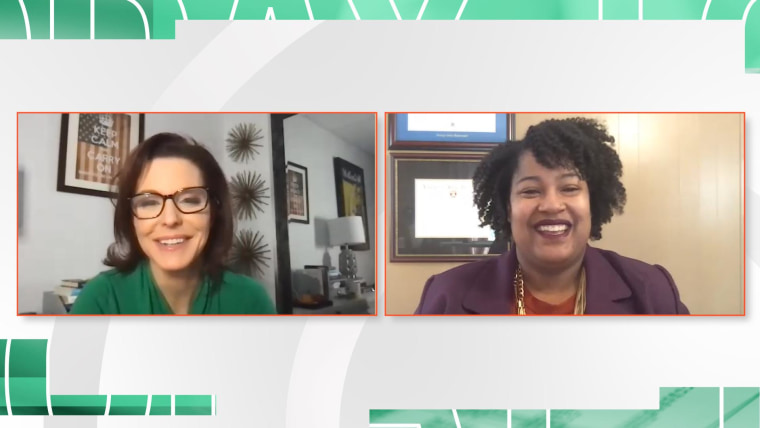Preparing and filing taxes isn’t high on most people’s list of preferred activities. And in a year in which the COVID pandemic brings many questions and changes, it is no wonder that most of us breathed a sigh of relief when the tax deadline was extended to May 17th.
Still, when it comes to getting your taxes done, avoidance is not the answer. With this simple information, and possibly the guidance of a seasoned tax professional, you can get this job out of the way and move on to more fun things.
Changes for this year
Filing your tax return will be different this year as legislation was passed due to the pandemic, millennial tax expert Kesha JonTae told TODAY.
“For example, unemployment benefits are usually 100% taxable,” said JonTae. “However, in March, Congress passed the American Rescue Plan Act, which released up to $ 10,200 per person in unemployment benefits as long as the adjusted gross earnings reported on return were below $ 150,000.”
In addition, the stimulus payments for 2020 and early 2021 had to be brought into line with the tax return for 2020. “These are just two tax changes that will affect this filing,” said JonTae ‘, noting that the changes actually represented some unique opportunities for tax professionals to develop strategies to ensure clients maximize their tax position. “These strategies involve married couples filing separately this year – which usually doesn’t offer an overall tax benefit – if their joint income was above the threshold to take advantage of those additional tax benefits,” she said.
connected
Stephanie Ruhle, NBC’s senior business correspondent, reported that your stimulus check is not taxed like income and that it cannot be stolen from you even if you owe money for your taxes.
“You normally get a tax credit like a refund. Instead, you get this in hand now,” explained Ruhle. “This is how you can spend it. Because we know how much people need it, you won’t be taxed on it.”

What about working from home?
While few of us have seen the inside of an actual office after the pandemic, that doesn’t necessarily mean you need to write off your home office, Stephanie Ruhle reported. If you are a W2 employee, you are not entitled to any discounts from home.
connected
“One big thing people need to know about is state taxes,” JonTae said. “For people who have worked remotely but typically live in one state and work in another, your status registrations may change. You may only need to submit feedback in the state you lived in because you are in the other State have not physically worked. “”

Should I make my own taxes?
You might be inclined to prepare your own tax return to save money or use software like TurboTax to save the expense of a tax professional.
Stephanie Ruhle reported that the IRS Free File allows you to prepare and file your federal income tax online for free if you make $ 72,000 or less. If you make more than $ 72,000, you can still use the IRS Free File Forms. However, you should know how to prepare your own tax return as the additional help is not offered here.
But whether or not you should actually collect your own taxes depends on your filing situation and your level of convenience when you know and understand tax law, ‘JonTae said.
“You should file your tax return yourself if you are sure that you understand your tax situation well enough to fill out the tax return correctly,” said JonTae. “However, when you return on your own, understand that there is always the possibility that you are missing something because you may not understand how to apply unfamiliar areas of the tax code.”
JonTae warned you that sometimes these errors can cost you more than the tax preparation fees you have saved and can be expensive to fix. “Consult a tax advisor if your factual pattern changes and you’re not sure if you understand the questions asked, own a business or rental property, have investments like employee stock options and cryptocurrency, or even if you just have that Feeling like you don’t want to process your tax return yourself, “she said.
connected
What are some commonly overlooked deductions?
Not making all of the deductions on your tax return is like losing money.
“For people who don’t own a business, some of the most overlooked 2020 deductions are the new $ 300 cash donation deduction and the $ 250 educator deduction – which now includes the cost of PPE,” JonTae said. “These are both ‘across the board’ prints, which means you don’t have to create line items to use them.”
With regard to the individual deductions, JonTae primarily sees the sales tax deduction for taxpayers who do not live in states with income tax. “The IRS allows taxpayers to deduct either state income tax or state sales tax, and a lot of people just miss the sales tax deduction, which in many cases is the difference between listing and standard withholding,” she said.
For people with business, some commonly overlooked deductions are the home office deduction, the depreciation allowance, and the mileage allowance. “These deductions can really help save money for businesses with small businesses,” said JonTae.
connected
What materials do you need to collect?
Before starting your taxes or seeing a tax advisor, make sure you have copies of all of your tax forms.
“Grab all of your W-2’s and don’t forget the job you were doing in early 2020 before the pandemic!” said JonTae ‘. “If you’ve picked up a sideline like driving for delivery services, you likely get a 1099-NEC that shows how much you’ve paid, but you’ll also want to make sure you print out the summary that shows how much you paid to have.” in platform fees and service fees. “
If you’ve made a distribution from your retirement account, you’ll need your Form 1099-R. “If you have a business or a rental property, you need an income statement that shows all of your income and expenses for the year,” she said. “HSA distributions generate a 1099-SA form, mortgage interest paid generate 1098. Basically, you should retrieve all of your tax documents and bring them to your tax professional. Bonus points if they are already out of the envelope and well organized.”
As for that huge shoebox full of paper receipts that you saved? JonTae said it wasn’t necessary.
“You don’t have to provide copies of every receipt for your prints, but you want to make sure you have that documentation in case the IRS ever questions it,” she said.
How can we get rid of our tax fears?
When it comes to paying your taxes, many people worry about it being messed up or scrutinized. But JonTae ‘said these fears are often unfounded and that they definitely shouldn’t stop you from taking action and completing your tax return.
“I think people are nervous about filing their tax returns because we’ve been told if we screw it up we’ll go to jail – and nobody likes jail,” JonTae said. “That’s not the case at all! ‘Tax Jail’ is for people who deliberately cheat on the government, not people who make mistakes. If you screw it up, you can fix it.”
While there is no foolproof way to avoid an audit, there are steps you can take to make sure the process goes smoothly in case you are ever selected for one.
“Don’t request any deductions or credits that you are not entitled to, and make sure you have or can easily obtain records of your claims,” she said. “If you paid a tax advisor to prepare your tax return, review the tax return before filing it.” JonTae emphasized the importance of understanding what is on your return, even if you don’t understand the exact numbers. “Income, deductions, and credits should make sense to you,” she said. “And when you get audited, don’t ignore the IRS. It won’t just go away.”
Overall, when you pay your taxes, be patient with yourself – and your tax professional.
“Congress made a lot of last-minute changes to the tax code for 2020, some as late as March 2021,” said JonTae. “If you work with a tax advisor, please show them grace this year. We’ll hear about all new changes and how they will affect your tax return as new information comes in.”
And if you have a tax bill, can’t you pay it? Ruhle said it was important to keep reaching out to the IRS to get payments.
“You may pay a few small fees, but you will pay very large fees … if you don’t pay at all,” said Ruhle. “So contact the IRS. Make a plan.”